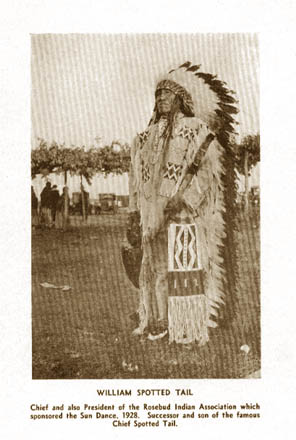


|
WILLIAM SPOTTED TAIL Chief and also President of the Rosebud Indian Association which sponsored the Sun Dance, 1928. Successor and son of the famous Chief Spotted Tail. |

|
"In the winter soon after that we started out again.
We camped nine times. We travelled early in the morning till late and
some days we made thirty miles. Then we got another way and slept
without fire. A blizzard came. We could not see and we ran into a camp
of Blackfeet Indians. We got three horses, each one, and started right
back in the storm. Our tracks were filled with the snow. We got in a
creek bed and ran into another camp before we saw them. A woman came
out and saw us. She told the camp and they fired on us. The horse I was
on was hit. He bucked but I stuck to him and we got home. When we were
near home I met my brother Kicking Bear who was going out on the
war-path. I turned around and went along again with him and the third
one took the horses on home. 'The party of Kicking Bear was thirty-eight, and three turned back. They were going far northwest on the Cannonball River. We camped seven times and came to a band of Blackfeet Indians in camp. The Blackfeet are brave and have good nerves. They sneak into Sioux camps and steal our children and take them home and make chiefs of them. "We waited till it got dark and got close to their camp. One of the Blackfeet coming out alone ran into the Sioux and became scared. He made a fright-noise,—like a wolf scared. We moved back into a hollow place where we could fight. When it was near day we tried to get a bunch of ponies but we could not get away with them. A Blackfoot came out on horse-back onto a hill. We took a shot at him but missed him and hit the horse. I saw the horse fall and ran to him. There was a high bank there and the Blackfoot rolled down it. It was about thirty feet. I stopped at the edge and shot at him but missed him. He shot at me and missed. He got away and I went back into the ravine where the other men were, and the Blackfeet surrounded us. We had a battle there. One of our men got shot in the hip but not killed. We finally ran them off. "When the great Sioux war came we had lots of battles with the soldiers. We were fighting all the time with Miles and Crook and white soldiers every place we went. "Some of the Indian agents were honest,—sometimes. Jim McLaughlin's wife was a cousin of my wife. I was not in the fight at Wounded Knee, but was there right after the soldiers shot into our women and children with machine guns and killed so many. The soldiers were wrong. They treated us bad. The army of the white people were afraid of us. They did not like Red Cloud because he talked and told the truth about dishonest agents. They put him in the guard- house at Fort Robinson and put a stick in his mouth (indicated three inches) and tied his hands so he could not talk when the army officers came to inspect. Sitting Bull was all right but they got afraid of him and killed him. They were afraid of my cousin, Crazy Horse, so they killed him. These were the acts of cowards. It was murder. We were starving. We only wanted food. "Crazy Horse was my cousin and best friend. A soldier ran a bayonet through his back. He was unarmed, and two other men held him by the arms when the white soldier came behind and put his bayonet through his kidney. I got there a few minutes after he was stabbed. When he was dead his father and brothers took him away and buried him. They never told where he is buried and now we do not know. "Crazy Horse was never with other Indians unless it was in a fight. He was always the first in a fight, and the soldiers could not beat him in a fight. He won every fight with the whites. "The young brother of Crazy Horse was on a trip where now is Utah, and there he was killed by some white settlers. They were having some trouble with the Indians there. When Crazy Horse learned that his brother was killed he took his wife with him and went away but told no one where he was going. He was gone for a long time. He went to the place where his brother was killed and camped in the woods where he could see the settlement. He stayed there nine days. Every day he would look around and when he saw some one he would shoot him. He killed enough to satisfy and then he came home. Crazy Horse was married but had no children. He was much alone. He never told stories and never took a scalp from his enemies when he killed them. He was the bravest chief we ever had. He was the leader and the first at the front in the Custer fight. He never talked but always acted first. He was my friend and we went in the Custer fight together. |
|
|
|
|
| previous page | table of contents | next page |